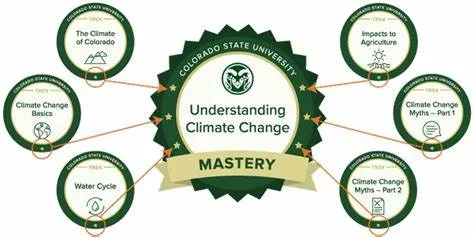Universities around the world are playing a critical role in addressing climate change through research, education, and community engagement. Many institutions have launched dedicated climate change programs, creating a platform for the next generation of scientists, policymakers, and leaders to tackle one of the most pressing issues of our time. These programs not only focus on scientific research but also integrate interdisciplinary approaches that connect environmental, economic, and social dimensions of climate action.

The Rise of Climate Change Programs
In response to the growing urgency of climate change, universities have developed robust programs that address the crisis on multiple fronts. These programs often encompass:
- Academic Programs: Offering undergraduate and graduate degrees in climate science, environmental policy, and sustainability.
- Research Initiatives: Engaging in cutting-edge research on topics like carbon capture, renewable energy, and adaptation strategies.
- Public Engagement and Advocacy: Working with local governments, NGOs, and businesses to implement climate solutions and influence policy.
For example, Stanford University offers a highly regarded climate change program through the Stanford Woods Institute for the Environment. The institute focuses on interdisciplinary research, linking science with decision-making to develop practical climate solutions. Similarly, Yale University’s School of the Environment integrates natural and social sciences in its climate change programs, emphasizing research and leadership development.
Leading Climate Change Programs
- Harvard University: Harvard’s Center for the Environment focuses on advancing knowledge about climate change through rigorous research and public policy discussions. Their undergraduate and graduate programs equip students with the tools to understand and mitigate environmental challenges.
- Oxford University: Oxford’s Environmental Change Institute (ECI) conducts pioneering research on climate systems, impacts, and mitigation strategies. The institute’s MSc in Environmental Change and Management is among the most recognized climate programs globally.
- University of California, Berkeley: UC Berkeley’s Energy and Resources Group (ERG) offers interdisciplinary graduate programs that focus on sustainable energy systems, environmental sciences, and equitable climate solutions.
- Columbia University: The Earth Institute at Columbia is home to the Lamont-Doherty Earth Observatory and offers programs that address the science of climate change and its impact on global ecosystems. Their Master’s in Climate and Society prepares graduates to work at the intersection of science and public policy.
Emerging Trends in Climate Education
The field of climate education is evolving rapidly. Many universities are integrating climate change content across diverse disciplines, from economics and engineering to law and urban planning. In addition to traditional coursework, climate change programs increasingly offer experiential learning opportunities, such as field research, internships with environmental organizations, and community-based projects.
Online education is also expanding access to climate education. Institutions like MIT, University of London, and University of Edinburgh offer online certifications and micro-degrees in climate change and sustainability, making it easier for working professionals to gain specialized knowledge in the field.
The Role of Universities in Global Climate Action
Beyond academic programs, universities are playing a pivotal role in broader climate action initiatives. They are reducing their own carbon footprints by adopting renewable energy sources, improving energy efficiency on campuses, and advocating for sustainability in institutional operations. For instance, Arizona State University has set a goal to become climate positive by 2035, a target that would see the university remove more carbon dioxide from the atmosphere than it emits.
Many universities also serve as research hubs that inform national and international climate policy. Faculty and students frequently contribute to reports like the Intergovernmental Panel on Climate Change (IPCC), providing critical data and analysis for global climate negotiations.
Conclusion
University climate change programs are at the forefront of equipping society with the knowledge and tools to confront climate change. By fostering interdisciplinary research, advocating for sustainability, and training future leaders, these institutions are playing a crucial role in shaping a more sustainable and resilient world. As the climate crisis intensifies, the contributions of universities will be ever more vital in developing innovative solutions that address both the environmental and societal challenges posed by a warming planet.